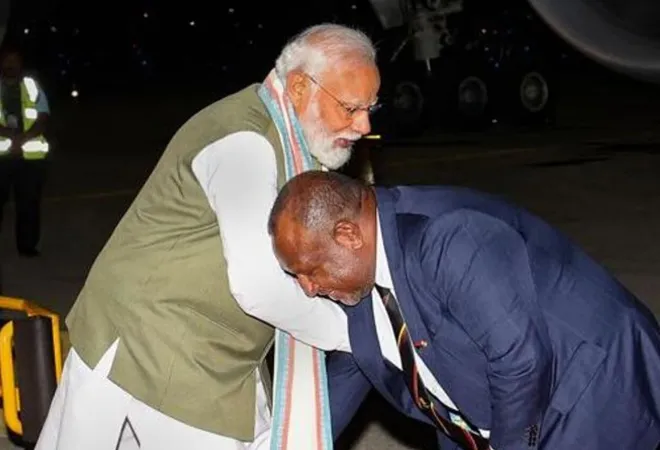It was symbolically significant that during Prime Minister Narendra Modi’s Papua New Guinea visit this week to attend the Forum for India-Pacific Islands Cooperation (FIPIC) meeting, to be attended by 18 Pacific Island leaders, US President Joe Biden was to join him. But Biden had to cancel his visit suddenly due to debt-ceiling talks going on in Washington. In the words of PNG’s Prime Minister James Marape, the Modi-Biden jugalbandi would have been “a historic first, and at the same time a ‘going forward‘ futuristic meeting of global superpowers in the biggest country in the Pacific.” He is right in underscoring its importance at a time when major powers are intent on reshaping the strategic configuration of the Indo-Pacific. For, now that the geopolitical struggle is becoming global, no part of the world will be immune from the ripples.
The centrality of Pacific Islands to the emerging geopolitical contestation between China and the US has been evident for quite some time. Beijing had been economically engaged with the region since the 80s, but that relationship has lately been transforming into a security-focused one. Last year, China and the Solomon Islands concluded a pact that is ostensibly about Beijing helping strengthen the island nation’s national security capabilities. But it includes provisions whereby China can “make ship visits to, carry out logistical replacement in, and have stopover and transition in Solomon Islands,” as well as use its forces to “protect the safety of Chinese personnel and major projects.”
China and the Solomon Islands concluded a pact that is ostensibly about Beijing helping strengthen the island nation’s national security capabilities.
In the past, the jostling for influence was between Taiwan and China in the region. But gradually, as China’s economic clout grew, most Pacific Island nations except the Marshall Islands, Nauru, Palau and Tuvalu shifted their allegiance to Beijing. The Solomon Islands were lured by China with the promise of a $730 million aid package in 2019. Despite local discontent, as expressed by senior leaders suggesting that “the long-term interests of our country, in terms of development aspirations, as well as respect for democratic principles, human rights, rule of law, human dignity and mutual respect, lie with Taiwan, not the People’s Republic of China,” Beijing’s stranglehold has only increased. There were anti-government riots in late 2021, leading to further Chinese ingress into the state security apparatus. In February, Daniel Suidani, premier of the South Pacific nation’s Malaita province, a strong critic of Chinese presence on the island, was removed from office.
China views the Pacific Islands as key to its Belt and Road Initiative and has used regional forums such as the Pacific Islands Forum (PIF) and the China-Pacific Island Countries Economic Development and Cooperation Forum (EDCF) quite effectively. Regular high-level interaction between China and the South Pacific has been the recent norm. Last year, then foreign minister of China Wang Yi pushed hard for a pan-region economic and security pact with 10 Pacific Island nations called the Five-Year Action Plan on Common Development. Though he did not succeed, it underlined the growing ambition China has for the region.
In contrast, the US approach had been lacklustre. Washington has been unable and unwilling to prioritize its ties with regional island nations. As China’s footprint expanded, America’s has been shrinking—quite literally with the closing of its embassy in the Solomon Islands in 1993. Its engagement has also been unidimensional with a focus on its military outreach, ignoring the developmental priorities of the region.
It took China’s overt positioning in the region to wake the US from its slumber, with Biden’s Indo-Pacific czar, Kurt Campbell, suggesting that the Pacific region might see “certain kinds of strategic surprise” in the form of Chinese military presence and that the US needed “to substantially step up
game”. This was followed by the White House unveiling a US-Pacific Island strategy to expand American diplomatic presence in the region and the first ever US-Pacific Island Country Summit last September. Its nine-point declaration included Washington’s steadfast support for the US-Pacific partnership, building American capacity in the region, coordinating with allies and partners on climate, economy, security and maritime cooperation, cyber security and connectivity, covid and health security and addressing legacies of conflicts.
Washington’s recognition that its lack of regional focus has allowed China to fill the void has prompted it to work with regional partners. Along with Australia, New Zealand, Japan and the UK, the US launched the Partners in the Blue Pacific initiative to support the Pacific Island region “according to principles of Pacific regionalism, sovereignty, transparency, accountability, and most of all, led and guided by the Pacific Islands.” As an observer in this group, India has high stakes in how the region evolves.
New Delhi had launched FIPIC with 14 Pacific Island nations in 2014 during Modi’s visit to Fiji. Since then, India has tried to keep up regular high-level interactions. Despite Biden’s cancelled visit, his plan to visit PNG when Modi would have been there carries an unmistakable message: the US-India partnership is no longer diffident about venturing into newer areas, and the two remain committed to providing an effective alternative to the Chinese push in the Pacific. The US would have to ensure that its domestic problems do not take its focus away from reassuring its allies and partners about its long-term strategic intent.
This commentary originally appeared in Live Mint.
The views expressed above belong to the author(s). ORF research and analyses now available on Telegram! Click here to access our curated content — blogs, longforms and interviews.




 PREV
PREV


